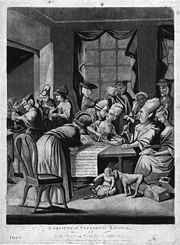
Edenton Tea Party
Encyclopedia

Edenton, North Carolina
Edenton is a town in Chowan County, North Carolina, United States. The population was 4,966 at the 2008 census. It is the county seat of Chowan County. Edenton is located in North Carolina's Inner Banks region. In recent years Edenton has become a popular retirement location and a destination for...
, in response to the Tea Act
Tea Act
The Tea Act was an Act of the Parliament of Great Britain. Its principal overt objective was to reduce the massive surplus of tea held by the financially troubled British East India Company in its London warehouses. A related objective was to undercut the price of tea smuggled into Britain's...
, which was passed by the British Parliament
Parliament of Great Britain
The Parliament of Great Britain was formed in 1707 following the ratification of the Acts of Union by both the Parliament of England and Parliament of Scotland...
in 1773. Inspired by the Boston Tea Party
Boston Tea Party
The Boston Tea Party was a direct action by colonists in Boston, a town in the British colony of Massachusetts, against the British government and the monopolistic East India Company that controlled all the tea imported into the colonies...
and the calls for tea boycotts and the resolutions of the first North Carolina Provincial Congress
North Carolina Provincial Congress
The North Carolina Provincial Congresses were extra-legal unicameral legislative bodies formed in 1774 through 1776 by the people of the Province of North Carolina, independent of the British colonial government.-First Provincial Congress:...
, 51 women, led by Penelope Barker, met on October 25, 1774, and signed a statement of protest vowing to give up tea and boycott
Boycott
A boycott is an act of voluntarily abstaining from using, buying, or dealing with a person, organization, or country as an expression of protest, usually for political reasons...
other British products "until such time that all acts which tend to enslave our Native country shall be repealed."
Organized by women
The Edenton Tea Party was a landmark, not because of the stances taken—boycotts were common across the Thirteen ColoniesThirteen Colonies
The Thirteen Colonies were English and later British colonies established on the Atlantic coast of North America between 1607 and 1733. They declared their independence in the American Revolution and formed the United States of America...
—but because it was organized by women. At the time, women were very much absent in politics and the Tea Party was one of the first instances of political action by women. Despite their usual absence at political gatherings, women played a significant role in the running of the household and were therefore crucial to boycott efforts instigated by men. Barker believed that action by women would be noteworthy in England and sent a copy of the declaration to the British press. She said at the time “Maybe it has only been men who have protested the king up to now. That only means we women have taken too long to let our voices be heard. We are signing our names to a document, not hiding ourselves behind costumes like the men in Boston did at their tea party. The British will know who we are.” While the reaction in England was mostly derogatory and dismissive, mainly because the signatories were women, in the colonies it inspired many other women to take up the boycotts and their actions were praised by many patriots
Patriot (American Revolution)
Patriots is a name often used to describe the colonists of the British Thirteen United Colonies who rebelled against British control during the American Revolution. It was their leading figures who, in July 1776, declared the United States of America an independent nation...
.
Text
Unlike many famous documents from the American Revolution, the petition signed at the Edenton Tea Party survives only through British accounts. The text of the petition, and the list of signers, was printed in the Morning ChronicleMorning Chronicle
The Morning Chronicle was a newspaper founded in 1769 in London, England, and published under various owners until 1862. It was most notable for having been the first employer of Charles Dickens, and for publishing the articles by Henry Mayhew which were collected and published in book format in...
and London Advertiser on January 16, 1775.
The full text of the petition reads:

